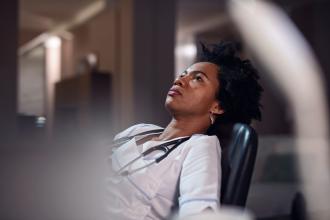Sleep: When it no longer comes naturally
“Hey doc, I can’t sleep.”
“What do you mean you can’t sleep?”
“I’m dog tired, but when I go to bed I just lie there and nothing happens.”
I’m sure many of you are faced with this patient complaint on a weekly basis. Formerly, I would think to myself that, of course, a person would sleep when they were tired and even if they had a few rough nights then sleep would come eventually. I have always been a good sleeper. I was a head-hits-the-pillow-and-I’m-out kind of guy. I have even fallen asleep at social gatherings and during conversations. However, all of this changed about 6 months ago. Initially, if I had a busy day planned or was planning to get up early to exercise I would wake up and watch the clock. This progressed to initial insomnia thinking about my busy day and then, bam, full-blown insomnia. I would struggle through the day overtired and think, boy, am I going to sleep well tonight. Forcing myself to stay awake, I would make it to 10 o’clock, climb into bed, and instantly be wide awake. Lying there, not sleeping, I would become irritated, which isn’t conducive to falling asleep. The longer this pattern continued the more irritated I became, which just made the cycle worse. I worked very hard at calming myself and would lie there in a relaxed state congratulating myself at how well I was doing, when a little voice would say, “but you’re not sleeping,” and so much for the relaxed state.
I turned to friends for advice. One suggestion was to think of as many words as you can spell starting with the letter A and moving down the alphabet, and before you know it you are asleep. Being competitive I would get irritated if I couldn’t come up with enough words and, well, you know the rest. Another suggestion was to tighten each part of my body, then relax it, leading to calm and sleep. Trying this technique I kept thinking of Kegels, which made me laugh and woke me up.
Next, I researched sleep hygiene, which is often the advice I give to my patients. It’s pretty obvious that consuming large quantities of water and caffeine in the evening might interfere with sleep. Also, getting regular exercise and not drinking your face off seemed logical. One hygiene tip is to avoid lying in bed, getting frustrated, and instead, getting up and doing something in another room until you feel drowsy again. This has helped my reading tremendously, but I’m not sure how much it has improved my insomnia. I sometimes wonder if I’m just training myself to get up numerous times during the night. I am glad that I haven’t turned to sedatives/hypnotics and that I don’t keep any on hand as, at 2 a.m., when you haven’t slept, you can’t pop what you don’t have.
The problem with all of this is that something natural has now become unnatural and associated with all sorts of rules. My pre-insomnia brain didn’t even register not sleeping as a possibility so this option didn’t exist. Now, despite my best efforts, I have anticipatory anxiety wondering if I am going to sleep. This battle is real and making it a conflict in the first place is part of the problem. Perhaps I have developed insomnia so that I can be more empathetic to those of my patients who also struggle. In case anyone up there is listening, I would like to point out that I already have tons of compassion for patients suffering from urinary retention and kidney stones. I’m sure I will soldier on, but if anyone has suggestions for some good book titles, please send them my way.
—DRR

